IEU'S FEATURED TOPIC IN UKRAINIAN CULTURE AND INTELLECTUAL HISTORY
THE UKRAINIAN MUSIC OF LATE BAROQUE AND CLASSICIST PERIODS
The chief characteristics of Ukrainian religious music in the Middle Ages were a cappella singing and monophony. The melodies were recorded in a nonlinear notation, called znamenna, written in above the words of the liturgical services. In the 14th to 17th centuries the development of music in Ukraine was greatly influenced by church brotherhoods and their choirs. A significant innovation was the introduction of polyphonic singing, leading to the development of the five-line notation called kyivske znamia that replaced the non-linear notation. The 'musical grammar,' written by the musicologist and composer Mykola Dyletsky in 1675, was a complete description of the theory of polyphonic music. A favorite musical form of the time was the partesnyi concerto, an a cappella composition for choir, consisting of one movement written to a religious text. The 18th century witnessed a paradoxical situation in which Ukrainian music started to reach a higher level of maturity and sophistication that was ultimately absorbed by Russian musical development. The Kyivan Mohyla Academy had an orchestra and choir comprising up to 100 musicians and 300 singers. The Hlukhiv Singing School provided thorough education for future musicians. Cossack starshyna families supported musical ensembles, the most notable of which was a kapelle and orchestra found at the court of Hetman Kyrylo Rozumovsky. But the musical talents of Ukraine usually did not remain in Ukraine; they were being drawn into the developing Russian musical life on an ever-increasing scale. The start of this trend could be seen already in the late 17th century, when Dyletsky was summoned to Moscow by the tsar to teach the rudiments of polyphonic singing, and in the early 18th century with the appointment of Ivan Popovsky as the precentor of the imperial court choir (and his subsequent recruitment of singers from Ukraine). From that time on, the most talented graduates of the Hlukhiv school were routinely brought to Saint Petersburg to further their musical education. The outcome of these practices can be seen by the late 18th century, when a trio of the most talented Ukrainian musicians of the age--Maksym Berezovsky, Dmytro Bortniansky, and Artem Vedel--composed exceptional works that became commonly regarded as 'Russian' music in the West... Learn more about the Ukrainian music of the late Baroque and Classical periods by visiting the following entries:
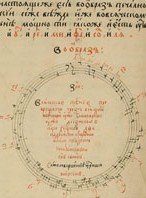
|
DYLETSKY, MYKOLA, b 1650? in Kyiv, d 1723? Music theoretician, composer, pedagogue. Dyletsky studied in Vilnius (1675) and worked for some time in Smolensk (1677), Kyiv, Moscow (1679), Saint Petersburg, Lviv, and Cracow. He was a master of polyphonic choral music. Among his works are compositions for four voices and eight voices, liturgical music, various motets, and canons. His most important theoretical work was Hramatyka muzykal'na (Musical Grammar), a textbook of polyphonic singing, which explains the fundamental theory of music, some principles of counterpoint, and the general rules of composition; it is illustrated by selections from the works of Dyletsky himself, M. Zamarevych, Ziuzka (probable pseudonym of either Lavrentii Zyzanii or Stepan Zyzanii), I. Koliada, M. Mylchevsky, Ye. Zakonnyk, and others. His theoretical views are augmented by comments on esthetics and on the educational value of music. The original text of the work, written in Vilnius in 1675, is not extant, but it exists in several variants and new redactions: 20 manuscript transcriptions are known...
|
| Mykola Dyletsky |
_s.jpg)
|
KYRYLO ROZUMOVSKY'S KAPELLE AND ORCHESTRA. A musical ensemble established in Hlukhiv in 1751 at the court of Hetman Kyrylo Rozumovsky. It was comprised of a fairly large choir and an orchestra that included a string section, a large woodwind section, and kettledrums. At its heyday, between 1752 and 1764, the kapelle employed over forty singers and musicians and represented one of the most accomplished musical ensembles in the Russian Empire. In 1753 Rozumovsky invited composer Andrii Rachynsky from Lviv to assume the post of kapelle's choirmaster. The kapelle and orchestra often took part in stagings of the works of opera and ballet together with the actors of Rozumovsky's theatrical troupe. Apart from that, they gave regular musical concerts, both of choral works and instrumental music, often featuring arrangements of Ukrainian folk songs that were particularly favored by Rozumovsky. Of special importance were concerts of sacred choral music, such as the choral concertos of Andrii Rachynsky, which were the first local compositions to introduce elements of the classicist style of music to Left-Bank Ukraine and the Russian Empire... |
| Kyrylo Rozumovsky's kapelle and orchestra |
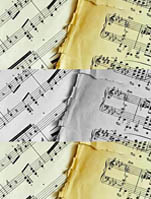
|
RACHYNSKY, ANDRII, b 24 November 1724 in Avhustiv (Velyki Mosty), Galicia, d ca 1800 in Novhorod-Siverskyi. Composer and conductor. A scion of a Galician noble family, Rachynsky studied at the Jesuit College in Lviv. Between 1749 and 1752, under Metropolitan Lev Sheptytsky, he conducted the metropolitan's kapelle at Saint George's Cathedral. In 1753 he was invited to work at the court of Hetman Kyrylo Rozumovsky in Hlukhiv. There, between 1753 and 1763, he conducted Kyrylo Rozumovsky's kapelle and orchestra, founded the Hlukhiv Music Library, and organized music education and music-cultural life in Hlukhiv and the Cossack Hetman state. He was also responsible for recruiting promising young singers from Ukraine for the court choir in Saint Petersburg. His choral compositions can be regarded as a transition between the baroque forms (partesnyi concerto) and classicism. These works include the sacred concerto Do Not Forsake Me in My Old Age, which likely inspired Maksym Berezovsky to compose his famous choral concerto of the same name. In fact, Rachynsky may have been Berezovsky's first music teacher in Hlukhiv.... |
| Andrii Rachynsky |
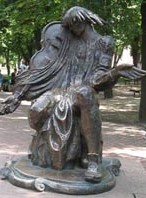
|
BEREZOVSKY, MAKSYM, b 27 October 1745 in Hlukhiv, d 2 April 1777 in Saint Petersburg. A prominent composer, one of the creators of the Ukrainian choral style in sacred music. Berezovsky likely sang with Kyrylo Rozumovsky's kapelle and orchestra in Hlukhiv under Andrii Rachynsky, from whom he learned the principles of composition in the classicist style. He moved to Saint Petersburg and from 1759 to 1760 performed as soloist with the Italian opera company in Oranienbaum near Saint Petersburg. From 1765 to 1774 he studied in Bologna, Italy, under Giovanni Battista Martini, and in 1771 gained the title of maestro di musica and became a member of the Bologna Philharmonic Academy. In 1775 he returned to Saint Petersburg, where, as a result of court intrigues, he committed suicide. Berezovsky was the first major representative of the early Classicist style in Ukrainian music. He was the composer of the opera Demofonte, a sonata for violin and harpsichord, and of a series of sacred works (including 12 concertos). The recent discovery of his unknown Symphony No. 11 indicates that he wrote a considerable number of other instrumental compositions... |
| Maksym Berezovsky |
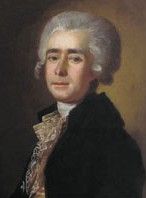
|
BORTNIANSKY, DMYTRO, b 1751 in Hlukhiv, d 10 October 1825 in Saint Petersburg. A prominent composer and conductor. After studying in the Hlukhiv Singing School, Bortniansky became a member of the court choir in Saint Petersburg in 1758. From 1769 to 1779 he studied in Italy, where he composed several operas to Italian librettos. Bortniansky also wrote liturgical works to Latin and German texts. On his return to Saint Petersburg he became a court composer, teacher, and conductor. During this period he composed his three French operas in 1786 and 1787. At the same time Bortniansky wrote a number of instrumental works (piano sonatas and a piano quintet with harp). In 1790 he wrote his Concerto-Symphony which for a long time (until the discovery of an earlier symphony by Maksym Berezovsky) was considered to be the first symphonic work composed in the Russian Empire. In 1796 he became the director of the court choir, which was composed mostly of Ukrainians and which he raised to a new level of excellence. During this period Bortniansky composed over 100 choral religious works... |
| Dmytro Bortniansky |
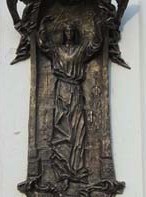
|
VEDEL, ARTEM, b 13 April 1767 in Kyiv, d 26 July 1808 in Kyiv. Composer, conductor, singer (tenor), violinist, and teacher. Educated at the Kyivan Mohyla Academy, Vedel worked briefly as a choirmaster in Moscow. In 1792 he returned to Kyiv to conduct a military choir. The period 1792-7 saw the height of his musical creativity and he composed most of his choral concertos and other works at that time. In 1797 Tsar Paul I prohibited the performances in churches of choral concertos or any other forms except for liturgical music. This prohibition proved particularly harmful to musical culture in Ukraine where choral concertos were particularly popular. Left without work, Vedel briefly joined the Kyivan Cave Monastery. He was banished to a mental asylum in 1799 after church authorities attributed to him some irreverent marginal notes scribbled in a religious book. The incarceration ended Vedel's creative work and led to his premature death. The publication and performance of his works were banned for over one hundred years after his death. Oleksander Koshyts was the first choirmaster to include Vedel's works in his choir's repertoire in the early 1900s... |
| Artem Vedel |
The preparation, editing, and display of the IEU entries featuring the Ukrainian music of the late Baroque and Classical periods were made possible by the financial support of the CANADIAN FOUNDATION FOR UKRAINIAN STUDIES.
ABOUT IEU: Once completed, the Internet Encyclopedia of Ukraine will be the most comprehensive source of information in English on Ukraine, its history, people, geography, society, economy, and cultural heritage. With close to 20,000 detailed encyclopedic entries supplemented with thousands of maps, photographs, illustrations, tables, and other graphic and/or audio materials, this immense repository of knowledge is designed to present Ukraine and Ukrainians to the world.
At present, only 62% of the entire planned IEU database is available on the IEU site. New entries are being edited, updated, and added daily. However, the successful completion of this ambitious and costly project will be possible only with financial assistance from IEU supporters. Become an IEU supporter and help the CIUS in creating the world's most authoritative electronic information resource about Ukraine and Ukrainians!
|
Click Home to get to the IEU Home page; to contact the IEU editors click Contact. To learn more about IEU click About IEU and to view the list of donors and to become an IEU supporter click Donors. ©2001 All Rights Reserved. Canadian Institute of Ukrainian Studies. |
